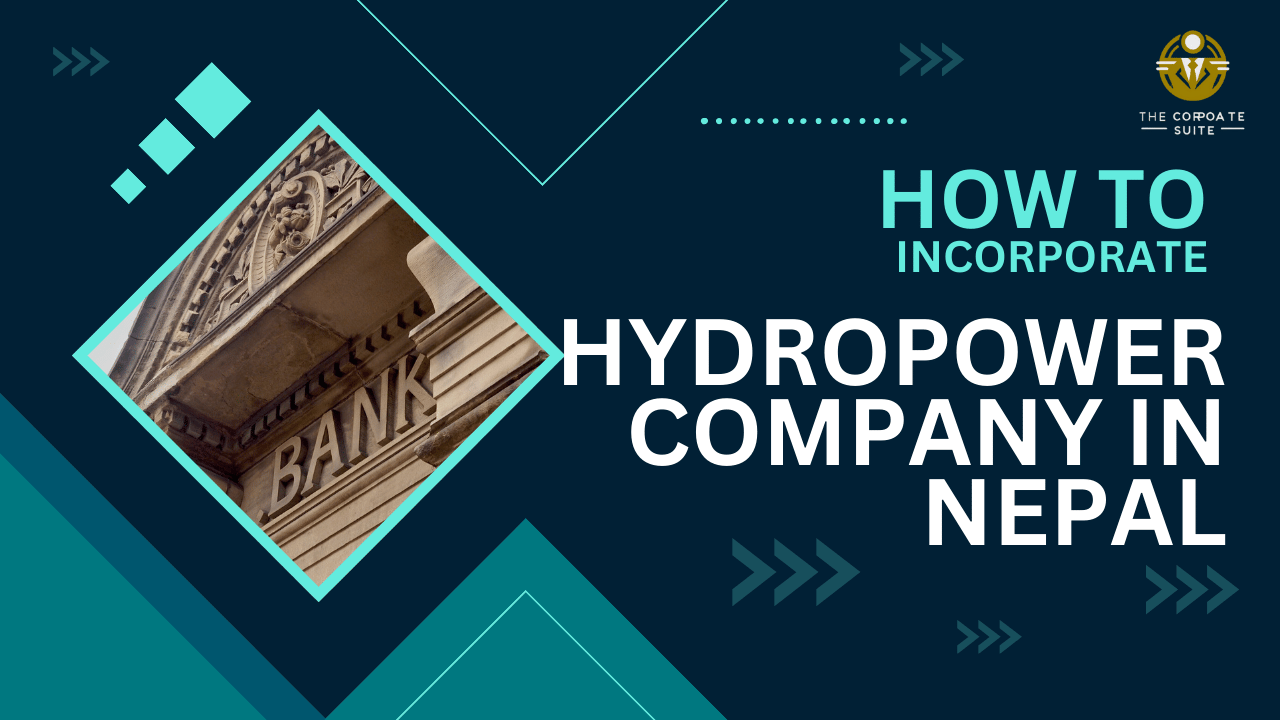
How to register Hydropower Company in Nepal?
To register a hydropower company in Nepal, several steps must be followed.
- First, conduct a name search with the Department of Industry (DoI) to ensure the proposed name is available and complies with regulations.
- Next, prepare the company’s memorandum and articles of association outlining its objectives, structure, and operational details.
- Then, submit the application along with required documents such as proof of identity, address, and nationality of directors/shareholders, as well as the company’s organizational structure.
- After the initial documentation, obtain necessary clearances and approvals from the Department of Electricity Development (DoED) for the feasibility study and environmental impact assessment.
- Concurrently, register with the Inland Revenue Department (IRD) for tax purposes and obtain a PAN certificate.
- Finally, once all approvals are secured, file for registration at the Office of the Company Registrar (OCR) and pay the applicable fees.
- Upon successful registration, the company can commence operations.
Public Company Registration in Nepal
Can foreigners register hydropower companies in Nepal?
Yes, foreigners can register hydropower companies in Nepal. Foreign investment in the hydropower sector is encouraged through the Foreign Investment and Technology Transfer Act (FITTA) and Industrial Enterprises Act (IEA). Foreign investors can establish companies either as fully foreign-owned enterprises or in joint ventures with Nepalese partners.
The process involves submitting an application to the Department of Industry (DoI) outlining the proposed investment, company structure, and expected contributions to Nepal’s economic development. Additionally, obtaining clearance from the Department of Electricity Development (DoED) for project feasibility and environmental impact assessments is mandatory.
Foreign investors must also comply with regulatory requirements set by the Nepal Rastra Bank (NRB) regarding foreign exchange transactions and repatriation of dividends. Once all approvals are obtained, including registration with the Office of the Company Registrar (OCR) and necessary tax registrations, the hydropower company can legally operate in Nepal.
How much capital is required for a hydropower company?
The capital required for a hydropower company in Nepal varies depending on the scale and capacity of the project. Generally, larger projects require substantial investment compared to smaller ones. The minimum capital requirement for hydropower projects is outlined by the Company Act and the Department of Electricity Development (DoED).
For example, a small-scale hydropower project might require capital investment ranging from NPR 20 million to NPR 100 million, whereas larger projects could necessitate investments exceeding NPR 500 million or more. The capital is used to cover various costs such as infrastructure development, equipment procurement, environmental assessments, and administrative expenses during the project’s initial phases.
Investors must ensure adequate financial resources are available to meet regulatory requirements and project milestones. Additionally, financial institutions may provide loans and financing options to support hydropower projects, subject to feasibility studies, environmental clearances, and project viability assessments conducted by regulatory authorities.
What are the regulatory requirements for registration?
The regulatory requirements for registering a hydropower company in Nepal encompass several key steps and approvals. Initially, prospective investors must conduct a feasibility study and obtain an environmental impact assessment (EIA) clearance from the Department of Electricity Development (DoED). These studies assess the project’s technical viability, environmental impact, and compliance with national regulations.
Subsequently, the company must register with the Department of Industry (DoI) by submitting a detailed application including the company’s memorandum and articles of association, shareholder information, and project details. Approval from the Department of Industry (DoI) and other relevant authorities such as the Ministry of Energy, Water Resources and Irrigation is essential before commencing operations.
Additionally, hydropower companies must comply with taxation regulations and obtain necessary permits and clearances from local authorities for land use, water rights, and construction activities. Regular reporting and compliance with labor laws, safety regulations, and environmental standards are also mandatory throughout the project’s lifecycle to ensure sustainable operation and regulatory adherence.
- Are there specific locations for hydropower company registration?
Hydropower companies in Nepal can be registered at specific locations designated by the Department of Industry (DoI). The registration process typically occurs at the DoI office responsible for the district where the company intends to operate. This ensures that the company is registered within the jurisdiction where its primary operations and projects are located. For example, if a hydropower project is planned in the Kaski district, the company would register at the DoI office in Kaski. This local registration requirement helps streamline administrative procedures and ensures that regulatory oversight and support are accessible to the company within its operational area.
Can a hydropower company offer shares to the public?
Yes, a hydropower company in Nepal can offer shares to the public. This process involves complying with regulations set forth by the Securities Board of Nepal (SEBON) and other relevant authorities. The company must first prepare a prospectus detailing the terms of the share offering, financial information, project details, and management structure. The prospectus is then submitted to SEBON for approval before shares can be publicly offered.
Public offerings allow hydropower companies to raise funds from a broader investor base, facilitating capital formation for project development and expansion. However, strict adherence to disclosure requirements, transparency standards, and investor protection measures is crucial throughout the offering process. SEBON oversees these activities to ensure fair and transparent practices in the securities market.
- How to draft the memorandum and articles for a hydropower company?
Drafting the memorandum and articles of association for a hydropower company in Nepal involves outlining the company’s objectives, operational scope, management structure, and shareholder rights. The memorandum defines the company’s constitution and its relationship with external parties, while the articles of association detail internal governance, management procedures, and shareholder rights.
To begin, identify key stakeholders and their roles within the company, including directors, shareholders, and management personnel. Clearly define the company’s primary objectives, such as developing and operating hydropower projects, and outline the geographical scope of operations within Nepal. Specify the authorized share capital, classes of shares, and voting rights associated with each class to ensure clarity and transparency in governance.
Additionally, consult legal advisors to ensure compliance with Nepal’s Company Act and other relevant regulations. Incorporate provisions for dispute resolution, amendment procedures, and shareholder meetings to facilitate effective corporate governance. Review and finalize the draft documents before submission to the Office of the Company Registrar (OCR) for registration and approval.
What are the compliance requirements for hydropower companies?
Hydropower companies in Nepal must adhere to various compliance requirements to ensure operational legality and environmental sustainability. Initially, companies must obtain necessary approvals from the Department of Electricity Development (DoED) for feasibility studies and environmental impact assessments (EIAs). These studies assess project viability, environmental implications, and compliance with national laws and regulations.
Furthermore, hydropower companies must register with the Department of Industry (DoI) and obtain business licenses, tax registrations, and necessary clearances from local authorities for land use and water rights. Compliance with labor laws, safety standards, and environmental regulations throughout project development and operation phases is mandatory to mitigate risks and ensure sustainable practices.
Regular reporting and auditing of financial statements, along with adherence to corporate governance principles outlined in the Company Act, are essential for transparency and accountability. Continuous engagement with regulatory bodies, stakeholders, and local communities fosters responsible corporate citizenship and enhances project acceptance and sustainability in Nepal’s dynamic hydropower sector.
- Can hydropower companies operate internationally?
Hydropower companies in Nepal can operate internationally, subject to meeting specific regulatory and legal requirements. Nepal’s Foreign Investment and Technology Transfer Act (FITTA) and other relevant regulations facilitate foreign investment and international operations. To expand internationally, a hydropower company must first ensure compliance with the legal frameworks governing cross-border operations, including international trade laws and agreements.
The company must secure necessary approvals from Nepal’s Department of Industry (DoI) and the Department of Electricity Development (DoED) before venturing abroad. This process includes obtaining clearances for technology transfer, environmental standards, and compliance with both Nepalese and international regulations. Additionally, the company must engage with Nepal Rastra Bank (NRB) for foreign exchange regulations and repatriation of profits.
Furthermore, establishing partnerships with international firms and securing financing through global financial institutions are crucial steps. These collaborations help enhance technological capabilities and financial viability. The company must also adhere to international standards for project development, environmental protection, and safety. Engaging with international regulatory bodies and industry associations ensures that the company remains compliant with global practices and standards, thereby facilitating smoother international operations.
In summary, while hydropower companies in Nepal can operate internationally, they must navigate a complex landscape of legal, financial, and regulatory requirements to ensure successful expansion and compliance with both domestic and international laws.
How to apply for licenses and permits for a hydropower company?
To apply for licenses and permits for a hydropower company in Nepal, follow a systematic process that involves several regulatory bodies. Begin by preparing a detailed project proposal, including the feasibility study and environmental impact assessment (EIA) report. Submit this documentation to the Department of Electricity Development (DoED) to obtain the necessary clearances and approvals. This step is crucial for assessing the project’s technical and environmental viability.
Next, apply to the Department of Industry (DoI) for company registration and business licenses. Ensure that all required documents, such as the company’s memorandum and articles of association, shareholder details, and proof of identity, are complete and submitted. Obtain a tax identification number (TIN) and other relevant permits from the Inland Revenue Department (IRD).
Additionally, secure local permits for land use, construction, and water rights from the concerned district authorities. Engage with local communities and stakeholders to address any social and environmental concerns, and obtain necessary clearances from local government bodies. Throughout this process, maintain regular communication with all regulatory agencies to ensure timely approval of all applications and permits.
By adhering to these steps and ensuring all documentation is thorough and complete, a hydropower company can successfully obtain the required licenses and permits to commence operations in Nepal.
- What are the reporting requirements for hydropower companies?
Hydropower companies in Nepal must adhere to specific reporting requirements to ensure transparency, regulatory compliance, and operational accountability. These requirements include regular financial reporting, environmental monitoring, and operational updates. Firstly, the companies must submit annual financial statements to the Inland Revenue Department (IRD) and the Department of Industry (DoI). These statements should be audited by a certified auditor to ensure accuracy and compliance with Nepal’s Financial Reporting Standards.
Additionally, hydropower companies must report on their environmental performance. This includes submitting regular Environmental Monitoring Reports (EMRs) to the Department of Electricity Development (DoED). These reports detail compliance with environmental regulations, impact mitigation measures, and any incidents or deviations from the approved Environmental Impact Assessment (EIA) plan.
Operationally, companies must provide periodic progress reports to the DoED and other relevant authorities, highlighting project milestones, financial status, and any challenges encountered. These reports ensure that the project remains on track and adheres to the approved plans and timelines. Companies are also required to maintain detailed records of their financial transactions, operational data, and compliance activities, which must be available for inspection by regulatory bodies at any time.
By fulfilling these reporting requirements, hydropower companies in Nepal demonstrate their commitment to regulatory compliance, environmental stewardship, and sustainable development practices.
- Can a hydropower company merge or acquire other companies?
Yes, a hydropower company in Nepal can merge with or acquire other companies, subject to compliance with Nepalese laws and regulations. The process involves several steps, beginning with due diligence to assess the financial, technical, and legal aspects of the target company. The Companies Act and relevant regulations under the Department of Industry (DoI) provide the legal framework for mergers and acquisitions (M&A).
To initiate a merger or acquisition, the companies must first obtain approval from their respective boards of directors and then submit a merger proposal to the Office of the Company Registrar (OCR). This proposal should include detailed terms of the merger or acquisition, valuation reports, and the strategic rationale behind the transaction. The OCR reviews the proposal to ensure it complies with the Companies Act and other relevant regulations.
Additionally, the merger or acquisition must be approved by the Securities Board of Nepal (SEBON) if the companies are publicly listed. This approval process involves submitting the necessary documents, including the merger plan, shareholder approvals, and financial statements. The transaction also requires clearance from the Department of Electricity Development (DoED) to ensure that the merger or acquisition does not adversely impact the project’s regulatory approvals and environmental standards.
- Are there any incentives for hydropower company registration in Nepal?
Yes, there are incentives provided by the Nepalese government to encourage hydropower company registration and investment in Nepal. These incentives aim to promote the development of the hydropower sector, which is crucial for Nepal’s energy security and economic growth. Incentives include tax holidays, customs duty exemptions on imported equipment and machinery for hydropower projects, and favorable financing options from domestic and international financial institutions.
Additionally, hydropower companies may qualify for incentives under the Foreign Investment and Technology Transfer Act (FITTA), such as repatriation of profits and dividends, and access to foreign loans and financing. These incentives reduce the overall cost of project development and improve the financial viability of hydropower investments in Nepal.
- How does registering a hydropower company contribute to the economy?
Registering a hydropower company in Nepal contributes significantly to the economy in various ways. Firstly, it enhances Nepal’s energy infrastructure by increasing electricity generation capacity, which is crucial for meeting domestic energy demand and reducing dependency on imported energy sources. This contributes to energy security and stability in the country.
Secondly, hydropower projects create employment opportunities across various sectors, including engineering, construction, operations, and maintenance. The influx of jobs stimulates local economies and improves living standards in rural areas where many hydropower projects are located.
Moreover, hydropower projects attract foreign investment and technology transfer, fostering economic growth and industrial development. The revenue generated from electricity sales contributes to government revenue through taxes and royalties, which can be reinvested in social infrastructure and public services. Overall, registering hydropower companies supports sustainable economic development, infrastructure improvement, and poverty alleviation efforts in Nepal.
- What are the advantages of hydropower companies in Nepal?
Hydropower companies in Nepal enjoy several advantages that contribute to their attractiveness for investors and developers. Firstly, Nepal has abundant water resources and high hydropower potential, making hydropower a reliable and renewable source of energy. This abundance ensures consistent electricity generation, reducing dependence on fossil fuels and mitigating greenhouse gas emissions.
Secondly, hydropower projects in Nepal benefit from government incentives and support, including tax holidays, customs duty exemptions on equipment and machinery, and favorable financing options. These incentives lower the overall cost of project development and improve financial returns for investors.
Furthermore, hydropower projects contribute to rural electrification and socio-economic development by providing clean and affordable electricity to remote communities. The development of infrastructure associated with hydropower projects, such as roads and transmission lines, improves connectivity and facilitates regional development.
Lastly, hydropower companies can leverage Nepal’s strategic geographical location between India and China to export surplus electricity, generating additional revenue and enhancing regional energy cooperation. Overall, hydropower companies play a crucial role in Nepal’s sustainable development by harnessing natural resources efficiently and contributing to economic growth and environmental conservation.
- Can hydropower companies participate in government projects?
Yes, hydropower companies in Nepal can participate in government projects through competitive bidding and tender processes. The Nepalese government frequently initiates hydropower projects to increase electricity generation capacity and improve energy infrastructure across the country. These projects aim to enhance energy security, reduce electricity shortages, and promote economic development.
To participate in government projects, hydropower companies must meet eligibility criteria specified in tender documents, including technical qualifications, financial capacity, and compliance with environmental and regulatory requirements. Companies must submit detailed project proposals, including feasibility studies, environmental impact assessments (EIAs), and financial plans to demonstrate their capability to execute the project successfully.
Successful bidders are awarded contracts by the concerned government agencies or departments overseeing energy and hydropower development. Once awarded, companies are responsible for project implementation, adhering to agreed timelines, quality standards, and contractual obligations. Government projects provide hydropower companies with opportunities to expand their operational footprint, gain experience in large-scale project management, and contribute to national development objectives.
Overall, participation in government projects enhances the role of hydropower companies in Nepal’s energy sector and supports efforts to achieve sustainable economic growth and energy independence.
- How to protect stakeholders’ interests in hydropower companies?
Protecting stakeholders’ interests in hydropower companies in Nepal involves implementing robust governance mechanisms and ensuring transparent communication. Firstly, companies should establish clear policies and procedures for stakeholder engagement, outlining channels for feedback and grievance redressal. Regular stakeholder consultations and public hearings should be conducted to gather input and address concerns from local communities, environmental groups, and other affected parties.
Secondly, hydropower companies must adhere to regulatory requirements and industry standards to safeguard environmental sustainability and mitigate social impacts. This includes conducting thorough environmental impact assessments (EIAs), implementing mitigation measures, and adhering to labor laws to protect the rights and safety of employees and communities.
Additionally, maintaining financial transparency through regular reporting and audits is essential to build trust among investors and financial stakeholders. Disclosing project progress, financial performance, and risks enables stakeholders to make informed decisions and ensures accountability.
Overall, fostering a culture of ethical conduct, accountability, and stakeholder inclusivity helps hydropower companies in Nepal protect stakeholders’ interests, promote sustainable development, and maintain social license to operate.
Are there any restrictions on foreign investment in hydropower companies?
Foreign investment in hydropower companies in Nepal is regulated under the Foreign Investment and Technology Transfer Act (FITTA) and Industrial Enterprises Act (IEA). While foreign investors are encouraged to participate in Nepal’s hydropower sector, there are certain restrictions and guidelines they must adhere to.
Foreign investors can establish hydropower companies as fully foreign-owned enterprises or in joint ventures with Nepalese partners. However, approval from the Department of Industry (DoI) and compliance with regulatory requirements are mandatory. These requirements include obtaining clearance from the Department of Electricity Development (DoED) for feasibility studies and environmental impact assessments (EIAs).
Additionally, foreign investors must comply with Nepal Rastra Bank (NRB) regulations regarding foreign exchange transactions, repatriation of dividends, and capital gains. These regulations aim to ensure that foreign investments contribute to Nepal’s economic development while safeguarding national interests and environmental sustainability.
Overall, while Nepal welcomes foreign investment in hydropower, it is subject to regulatory oversight to promote responsible investment practices and protect national resources.
- What role do hydropower companies play in Nepal’s energy sector?
Hydropower companies play a crucial role in Nepal’s energy sector by harnessing the country’s abundant water resources to generate electricity. Nepal has significant hydropower potential, estimated at over 80,000 megawatts (MW), making it one of the richest countries in terms of water resources per capita. Hydropower contributes to Nepal’s energy security by providing a reliable and renewable source of electricity, reducing dependence on imported fossil fuels and mitigating greenhouse gas emissions.
Furthermore, hydropower projects contribute to rural electrification, improving living standards and supporting economic development in remote areas. The sector creates employment opportunities across various stages of project development, from construction and engineering to operation and maintenance. This stimulates local economies and enhances infrastructure development, including roads and transmission lines.
Moreover, hydropower companies in Nepal play a pivotal role in regional energy cooperation, exporting surplus electricity to neighboring countries like India and Bangladesh. This enhances Nepal’s geopolitical position and fosters economic integration within the South Asian region.
In summary, hydropower companies contribute significantly to Nepal’s energy sector by providing clean, sustainable electricity, promoting economic development, and enhancing regional energy cooperation.
- Can hydropower companies collaborate with other industries or sectors?
Yes, hydropower companies in Nepal can collaborate with other industries and sectors to enhance operational efficiency, promote sustainable development, and leverage synergies. Collaboration opportunities exist with industries such as agriculture, tourism, and manufacturing, as well as with government agencies, non-governmental organizations (NGOs), and academic institutions.
For example, hydropower companies can collaborate with agricultural sectors to utilize water resources for irrigation purposes, enhancing agricultural productivity and supporting local livelihoods. Partnerships with tourism sectors can promote eco-tourism and cultural heritage conservation around hydropower reservoirs and scenic areas, generating additional revenue streams.
Furthermore, collaborations with government agencies facilitate infrastructure development, such as roads and bridges, to improve access to remote project sites. Cooperation with NGOs and academic institutions promotes research and innovation in environmental conservation, renewable energy technologies, and community development.
Hydropower Company in Nepal
What licenses are required for hydropower projects?
Hydropower projects need survey license, generation license, and environmental clearances.
Can foreign companies invest in hydropower in Nepal?
Yes, foreign investment is allowed in hydropower, with some capacity-based restrictions.
What’s the typical concession period for hydropower projects?
Concession periods are usually 30-35 years for larger projects.
Are there royalty payments for hydropower generation?
Yes, hydropower companies pay capacity and energy royalties to the government.
What agency regulates hydropower companies in Nepal?
The Department of Electricity Development is the primary regulatory body.







